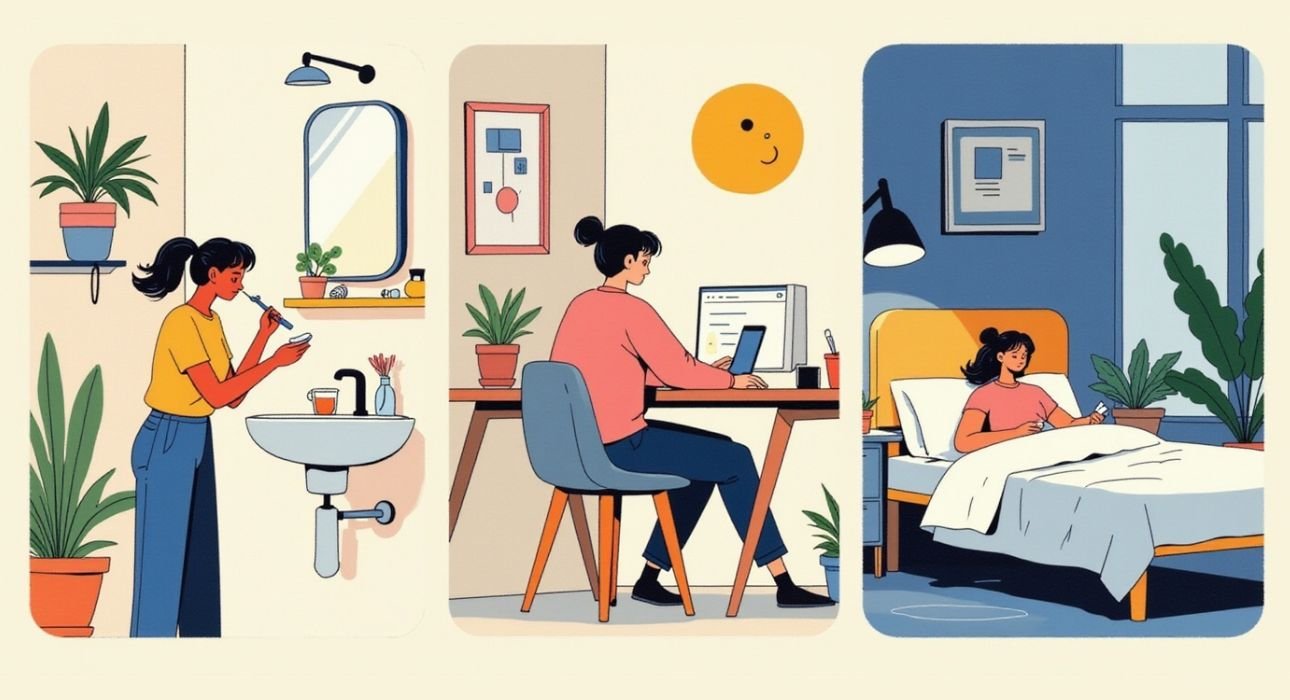Routine plays an essential role in our lives. It shapes how we navigate through the day, providing structure, predictability, and stability. A normal rhythm provides comfort and ease for most individuals because it has the effect of providing a feeling of control and diminishing the time spent on mental work. Yet although routines can offer security, they can also be limiting, blocking innovative thinking, adaptability and growth. Hence, the challenge is to achieve the right balance between the comfort of habits and the liberty of irregularity and change.
Read More: The Psychology of Routine: Experts Insights
The Comforting Nature of Routine
1. Predictability and Control
Routine provides a feeling of knowing ability and control, leading to decreased anxiety and cognitive overload. Through the regularisation of behaviour, humans can devote energy to higher-level tasks that require less drudgery than the constant decisions easy to make (Duhigg, 2012). For example, a regimented morning routine can help ensure that a person takes a quiet, driven start to the day, which can, in turn, enhance concentration and work output.
2. Mental and Emotional Benefits
Routine can be reassuring with the emotional support of familiarity and is helpful in challenging or ambiguous situations. The predictability of routine is calming and can give people a feeling of stability in a chaotic world. Baumeister Tierney (2011) explains how habits and routines protect willpower and energy so that one is better able to manage stress and focus on goals without becoming swamped by the decision-making demands of day-to-day living.
In addition, it is possible to achieve this by establishing routines that favour self-care and thus preserve both mental and physical health. Ordinary activities (physical activity, healthy eating, sleep) have an important positive impact on emotional resilience and general well-being (Clear, 2018).
3. Boost to Efficiency and Productivity
Effectiveness can be achieved through the use of known routines. Repetitive procedures lower the cognitive load for decision-making, therefore reducing the person’s effort in the execution of the procedure could be reduced. Habits are the compound interest of self-development,” (Clear, 2018) in that repeated effort through time produces considerable levels of long-term productivity improvements). For example, setting a specific time each day for work or study ensures a structured approach to completing tasks, which, in turn, enhances productivity.
4. Development of Discipline
Routines help cultivate discipline by instilling a sense of consistency and accountability. When individuals stick to a routine, they learn to commit to actions even when they are not immediately enjoyable. According to Covey (1989) in The 7 Habits of Highly Effective People discipline that arises from repetition helps people get their behaviours in line with their long-term objectives, which leads to self-development.
Read more: The Psychological Benefits of Routine in our life
The Stifling Nature of Routine
1. Monotony and Lack of Excitement
Although routines offer consistency, they can also be boring. Doing the same thing over and over each day can lead to a feeling of boredom and thus the feeling that life is unendingly, and uninspiringly, routine. In line with Csikszentmihalyi(1990), routinizing can, on the one hand, beget efficiency, but at the same time can also create an impediment to ever living life‘s joy and delight because it stifles novelty and excitement. If routine fails to offer variety, people tend to feel stuck, and this can lead to a dampening in enthusiasm and motivation.
2. Suppression of Creativity
Creativity tends to thrive where freedom of movement and the flexibility to deviate and the unexpected are acceptable. When people become strictly dependent on a regimented routine they can become limited in the capabilities to generate/experiment. As noted by Clear (2018) although habits may result in great efficiency, they can limit the scope for creative exploration, if not moderated. For instance, an artist who strictly practices a set time plan for creating may discover that it inhibits the drawing process since creative thought is best unconfined and in flux.
3. Resistance to Change
Regularity can endow people with resistance to change since they are so drawn to the security and comfort it affords them. This resistance can also inhibit people from adopting new ideas, possibilities, and/or required changes in their own or others’ lives. Duhigg (2012) argues that routines are strong because they automatize behaviour but are also strong enough to create inertia that is hard to overcome. This rigidity can inhibit progress, particularly when adaptation is essential, such as when new technologies or skills are required.
4. Confinement and Lack of Freedom
While routines offer structure, they can also feel confining. The predictability that comforts routines can also constrain the experience. If people get too attached to their everyday routines, they can be trapped by a routine structure and become less free and have less choice. According to Baumeister and Tierney (2011), habits that are nonadaptive may result in a loss of freedom, in which behaviour is limited by the earned repetition of routines.
Read More: Brainstorming: A valuable technique for getting ideas
Balancing Routine and Flexibility
In order to limit the constricting nature of routine, a delicate balance of structure and free play needs to be achieved. Learning to utilize the strengths of repetitiveness and licence in not doing (i.e., the arts and crafts of changing and relaxing) while allowing for variety and the unexpected can result in a richer, more dynamic life.
1. Incorporating Variety
Variety is an effective solution to prevent routines from becoming tedious. People can keep the sense of predictability from a routine, but bypass boredom, by changing elements of the routine or engaging in new experiences. This method is advantageous in that it provides all the advantages of routine without compromising fun, novelty, and engagement (Clear, 2018).
2. Setting Broader Goals Beyond Routine
Long-term goals, which will help motivate and keep a person engaged, beyond making it an everyday routine, can play a role. By aligning routine behaviours with broader aspirations, individuals can ensure that their habits contribute to personal growth and meaningful achievements. Covey (1989) has shown that with a clearly defined purpose, people can assess and modify their daily routines so that they more closely conform to their ambitious goals.
3. Creating Time for Reflection
Regular reflection on one’s routines can help identify areas of improvement or change. Finding out whether routines support growth, or whether they are counterproductive, is critical to achieving a balance that works. According to Baumeister and Tierney (2011), reflecting provides people with the means to consciously choose the way they interleave time, such that routines do not command them but do reflect the extent to which they are efforts towards the attainment of goals.
4. Allowing for Spontaneity and Change
Integrating spontaneity and accepting change is crucial to maintaining equilibrium. The routine should not be rigid; it must leave space for new experiences, challenges, and personal exploration. As Csikszentmihalyi (1990) emphasizes, achieving “flow” a state of deep immersion in an activity requires a balance of skill and challenge, both of which are fostered by flexibility and variety in routine.
Read More: Do You Have A Routine That You Follow??
Conclusion
Routines offer both comfort and potential constraints. They provide stability, efficiency, and discipline, but when followed too rigidly, they can lead to monotony, stifle creativity, and prevent personal growth. Striking a balance between predictability and adaptability, people can experience the advantages of habit and yet be open to change and discovery. In the end, routines should be tools for personal development, efficiency and happiness, not leashes that restrict liberty and creativity.
References +
Rediscovering the Greatest Human Strength. Penguin Press.
Clear, J. (2018). Atomic Habits: A Simple Effective Technique for Forming Positive Habits Breaking Negative Habits. Avery.
Powerful Lessons in Personal Change. Free Press.
Csikszentmihalyi, M. (1990). Flow: The Psychology of Optimal Experience. Harper & Row.













Leave feedback about this